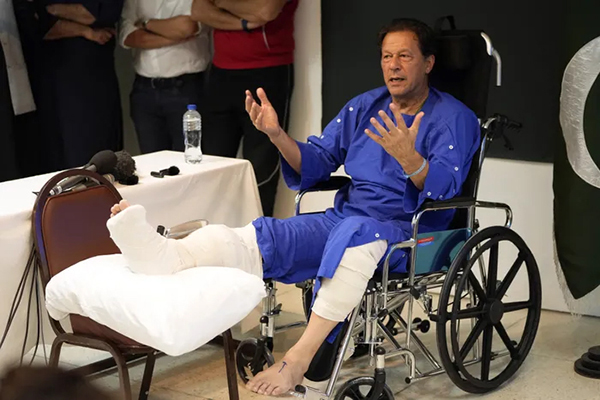
The attempt to assassinate former Pakistan PM Imran Khan has not only thrown the country into chaos but can also have serious implications for its neighbours. Imran, who was ousted from office in April after a no-confidence vote in parliament, has been on the warpath since then and was leading a ‘long march’ to Islamabad to press for early elections. Shots were fired at his convoy by a gunman in Wazirabad, Punjab. Imran sustained bullet injuries in his leg; one person was killed and at least 10 were hurt. While Imran is recovering, several rounds of recriminations — which started soon after the attack — have made everyone a suspect. His Pakistan Tehreek-e-Insaf colleagues have quoted Imran to pin the blame on PM Shehbaz Sharif and an army General; the ruling Pakistan Muslim League (N) has blamed ‘religious fanaticism’; and critics have insinuated that he orchestrated the attack on himself to garner sympathy.
Intriguingly, each one of these allegations could be true. Imran has been on a course of confrontation with the army, blaming it — and the US — for his ouster. The attack could be the handiwork of religious fanatics, too — the would-be assassin has said that he wanted to kill Imran because he was ‘misleading’ people and the loudspeakers of his cavalcade were interfering with the aazan. And though it would be uncharitable to believe that it was a staged attack, there are many who believe this to be true.
The attack on Imran took place exactly a week after two Generals, representing the army and the ISI, declared that the army ‘as an institution has decided that it would stay out of politics.’ This claim is being treated with scepticism, and there are reports of there being pro-Imran and anti-Imran factions in the army. Indeed, it is believed that Imran could not have been so critical of the army if he did not have the backing of a few powerful Generals. India, ‘closely monitoring the situation’, would hope for democracy to prevail in Pakistan because military rule has been disastrous for that country, and detrimental to peace in the neighbourhood.

















